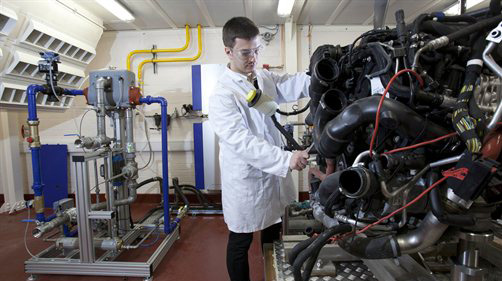Engines for the Future
The engines of today are both powerful and efficient, but the engines of tomorrow need not only to be powerful and efficient but significantly greener. Our mechanical engineers are working with some of the biggest names in industry to develop future fuels (including biofuels) and new combustion system/after treatment to reduce the environmental impact of transport.

We work closely with UK industry in engine design and advanced engine technologies, helping to design the engines and fuels of the future.
Our exceptional engine research and development labs are second-to-none: Our Future Engines and Fuels Laboratory houses ten engine test bed facilities for engines, fuels and catalysts and it is here that we carry out extensive collaborative work with the likes of Jaguar Land Rover, Ford, Johnson Matthey and Shell.
The main challenge in engine development is to enhance fuel efficiency and the reduction of emissions such as nitrogen oxides and carbon monoxide. Changing the way fuel is injected into the cylinder can improve both combustion and performance. Our facilities for new combustion mode (e.g. homogeneous charge compression ignition (HCCI)) include a glass cylinder in which it is possible to perform world-leading measurements of fuel injection and combustion.
Biodiesel can be manufactured from, for example, vegetable oil. This is used in blended fuels, the global consumption of which is about 30 billion gallons per year. Our research has helped manufacturers to understand the possible proportion of biodiesel in order to both optimise performance and reduce carbon dioxide and other regulated emissions.
Impact:
- We are working with Jaguar Land Rover (JLR) to improve current and future generation engine technology, as well as on next generation gasoline direct injection (GDI) combustion technology.
- Using Birmingham research, JLR has been able to improve the flexibility of its engine technology to accept a wide range of environmentally-friendly fuels.
- With the results of our research, Johnson Matthey has been able to optimise its environmental catalyst technology. This is helping to reduce regulated and unregulated pollutant emissions, thus lessening the environmental impact.
- Shell is one of the largest purchasers and distributors of biofuels in the world. Through Raízen, a joint venture between Shell and Brazilian firm Cosan to produce ethanol from Brazilian sugar cane, it produces more than two billion litres of biofuel annually. We have helped the company to design fuels that are compatible with current engine technologies.